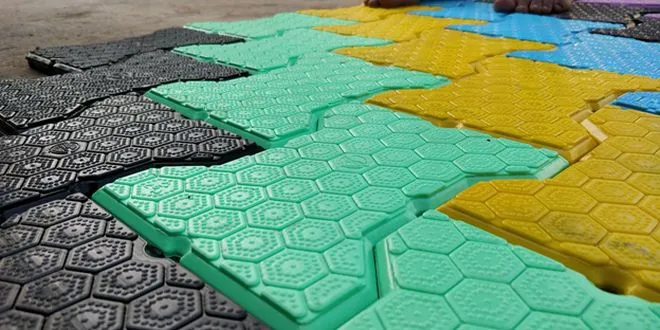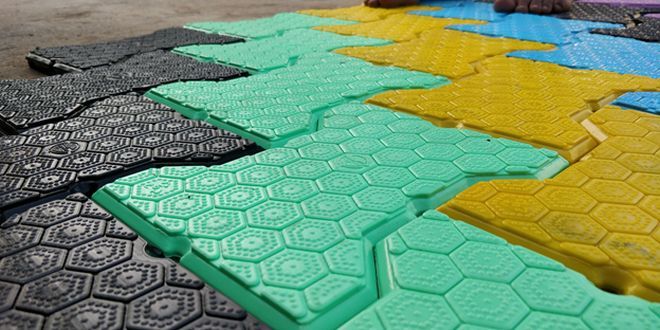This Bengaluru-based NGO converts discarded plastic waste into colourful and cheap tiles
Initiated by the NGO Swachha, each Re-Tile costs between Rs 70-90 and up to 10,000 tiles can be manufactured everyday with around 3-4 tonnes of plastic.
To ease the burden of plastic menace in the city of Bengaluru, a local NGO, Swachha, has come up with an innovative solution by partnering with Bruhat Bengaluru Mahanagara Palike Dry Waste Collection Centre (DWCC), Attur. Swachha has come up with a solution that can make discarded plastic waste into tiles called ‘Re-Tile’.
What makes its different from the conventional tiles is its anti-slippery property, in addition to which it can be recycled infinitely. It takes 15 disposable food containers or 150 polythene bags or disposable spoons or 10-15 cosmetics bottles to make one Re-tile.

In terms the physical property, the tiles have a resistance of up to 150 degrees Celsius, are fire retardant and can bear a load of up to 35 tonnes. To compete with the conventional cement tile market, the Foundation has kept its price between Rs 70-90 per square feet, depending upon its properties such as load-bearing capacity, quality, and colour to name a few.
In an interview with NDTV, Rajesh Babu, founder of Swachha NGO said,
“What we do is we help the local civic body in waste management by collecting waste from households in a segregated manner. Bengaluru on an average daily generates some 4,000 tonnes of waste daily, which then comes to 170 decentralised dry/waste collection centres and one waste processing unit in the city. As out of the daily waste production of Bengaluru, most of the amount is plastic, we decided to use that further by making something productive out of it.”
To get the plastic ready for the tiles, the waste is transported from the community to the decentralisation unit for segregation, after which the plastic is sent to Swachha’s waste processing unit. To bring in uniformity to the colour of the tiles produced, the plastic waste is segregated into different grades and colours.
Later, the plastic waste is ground into smaller pieces in terms of granules and converted into colourful Re-Tiles.
Speaking on the challenges faced in innovation, Babu said,
“Recycling is the way of life and the need of the hour, but in our country, it is still not done the way it should be done. We have made this innovation, but the challenge is that we don’t have the correct platform or support from the government. There are thousands of things we can do with plastic, but we have for now just Re-Tiles that is because we don’t have that much support from the authorities. No one in today’s time wants to invest in recycling the low-grade plastic because it costs a lot of money. We want to urge companies to take the responsibility of the plastic products they are producing, it is only then we as other recyclers can join and help reduce the waste burden from the planet.”
The tiles can be used in building houses, roads, walkways, swimming pools, apart from wall cladding. At present, the NGO can manufacture around 10,000 tiles every day with three to four tonnes of plastic, reports The Hindu.
Do you have an interesting story to share? Please write to us at [email protected]. To stay updated with more positive news, please connect with us on Facebook and Twitter











